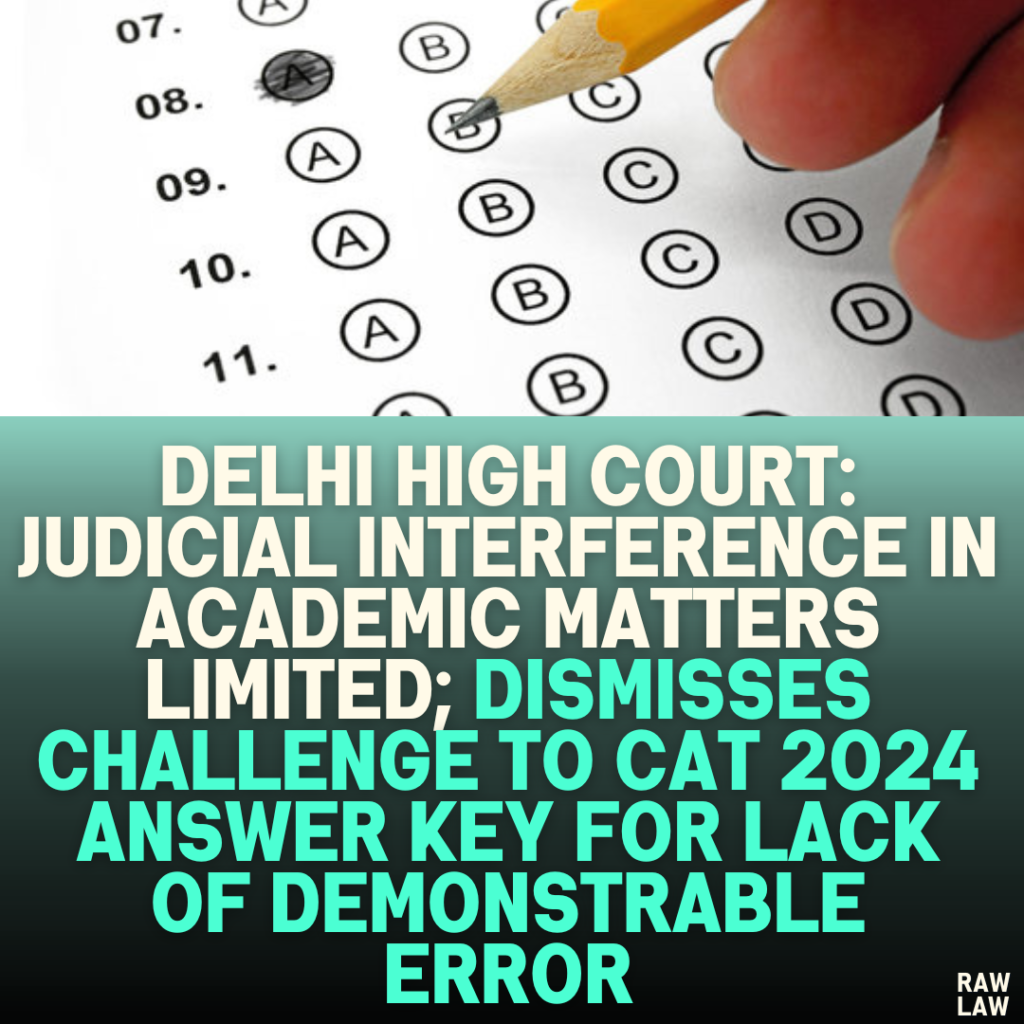1. Court’s Decision
The Delhi High Court dismissed a petition seeking modifications to the CAT 2024 results. The petitioner had challenged the correctness of an answer in the official answer key, arguing that the final key contained an error. The court ruled that:
- Judicial intervention in academic matters is limited to cases involving clear and demonstrable errors.
- Academic evaluations and answer keys must be presumed correct unless conclusively proven otherwise.
- There was no merit in the petition, and the CAT 2024 results were upheld as valid.
2. Facts
- Petitioner’s Grievance:
- The petitioner alleged that an answer key for a specific question in the VARC section of CAT 2024 was incorrect.
- The petitioner submitted objections through the official mechanism, which were subsequently dismissed.
- Background of the CAT 2024 Examination:
- Conducted on November 24, 2024, across 170 cities, with 2.93 lakh candidates participating.
- Provisional answer keys were released on December 3, 2024, and candidates were given a window to raise objections.
- Petitioner’s Case:
- Supported by private coaching institutes’ experts, the petitioner claimed that “Option 4” was the correct answer for the disputed question, whereas the official key listed “Option 3” as correct.
- Argued that rejecting objections was arbitrary and lacked transparency, adversely affecting meritorious candidates like the petitioner.
- Respondent’s Case:
- Emphasized the robust process followed to finalize the answer key.
- Highlighted that a Subject Matter Expert (SME) panel with decades of experience reviewed all objections meticulously before confirming the key.
3. Issues
- Can courts intervene in academic matters such as the correctness of answer keys?
- Did the petitioner demonstrate a clear and demonstrable error in the official answer key?
4. Petitioner’s Arguments
- Incorrect Key:
- The petitioner argued that “Option 3” (official answer) was inconsistent with the passage in the question and was demonstrably incorrect.
- Claimed “Option 4” better aligned with the concerns raised in the question.
- Expert Opinions:
- Relied on expert opinions from private coaching institutes to support their case.
- Claimed these experts unequivocally deemed the official answer incorrect.
- Lack of Transparency:
- Alleged that the process for evaluating objections lacked transparency.
- Argued that the respondents failed to justify their selection of the official answer.
- Impact on Merit:
- Claimed that the incorrect key adversely impacted not only the petitioner but also other meritorious candidates.
5. Respondent’s Arguments
- Robust Process:
- The answer key was finalized through a rigorous process by a panel of SMEs comprising highly qualified professionals from leading institutions.
- The panel collectively possessed over 78 person-years of academic experience, ensuring a meticulous review of objections.
- Transparency:
- The provisional answer key was made public, and candidates were allowed to raise objections.
- Each objection was reviewed and scrutinized by experts, and the process was documented.
- Judicial Deference:
- Cited precedents emphasizing that courts should defer to academic expertise and refrain from re-evaluating answer keys unless there is a glaring error.
- Impact on Academic Calendar:
- Altering results would disrupt the admission timelines of over 100 institutions relying on CAT scores.
6. Analysis of the Law
- Judicial Precedents:
- The court referred to Kanpur University v. Samir Gupta, where it was held that an answer key must be presumed correct unless it is clearly demonstrated to be wrong.
- Cited Ran Vijay Singh v. State of Uttar Pradesh, which reiterated that courts should avoid interfering in academic decisions unless a material error is evident.
- Standard for Intervention:
- Errors in an answer key must be glaring and demonstrable without requiring inferential reasoning or rationalization.
- Judicial review is limited to cases involving procedural irregularities or malafides.
- Court’s Findings:
- The petitioner’s claim relied on inferential reasoning rather than clear evidence of error.
- The respondents followed a transparent and rigorous process to finalize the answer key.
7. Precedent Analysis
- Kanpur University v. Samir Gupta:
- Courts should not second-guess academic decisions unless errors are glaringly obvious.
- Ran Vijay Singh v. State of Uttar Pradesh:
- Emphasized the presumption of correctness for answer keys.
- Courts should exercise caution in interfering with academic matters.
- Basavaiah (Dr.) v. Dr. H.L. Ramesh:
- Academic decisions by experts must be respected unless malafides or irregularities are proven.
8. Court’s Reasoning
- Presumption of Correctness:
- The court reiterated that the SME panel’s decision should be presumed correct unless conclusively proven otherwise.
- Inferential Reasoning:
- The petitioner’s arguments required inferential reasoning to establish the error, which is insufficient to warrant judicial interference.
- Transparency and Expertise:
- The court found no procedural irregularities or malafides in the respondents’ process.
- Emphasized the qualifications and experience of the SME panel.
- Impact on Academic Calendar:
- The court noted the potential disruption to the admission process for numerous institutions.
9. Conclusion
The court dismissed the petition, holding that:
- The petitioner failed to demonstrate a clear and glaring error in the official answer key.
- The respondents followed a robust and transparent process to evaluate objections.
- Judicial interference in academic matters is unwarranted in the absence of demonstrable errors.
10. Implications
- Judicial Deference:
- Reaffirms that courts should respect the autonomy of academic bodies.
- Standard for Challenges:
- Sets a high threshold for challenging answer keys, ensuring the integrity of academic evaluations.
- Consistency in Admission Processes:
- Maintains the stability and predictability of academic calendars, benefiting a large number of candidates.



